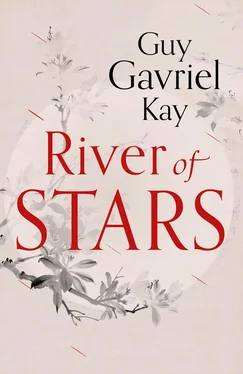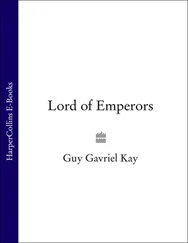1 ...7 8 9 11 12 13 ...34 All his life. His too-long life.
That sweet, shy cousin had died years ago, a wife and mother. His own wives had died, both of them. He’d liked the second one better. Two concubines were gone, and mourned. He hadn’t taken another. Two sons were dead. Three emperors he’d known. Too many friends (too many enemies) to name or number.
And still the girl approaching beside the long, eager figure of Lin Kuo caused him to set down his green cup and rise (despite his knees) to greet the two of them on his feet. It was a good thing, he told himself. You could be dead while alive, lose all taste for life, and he didn’t want to do that.
He had strong opinions on where Hang Dejin and his followers were leading the emperor with their New Policies, and he was vain enough to believe his views might matter, even now. He loathed the long, foolish war against the Kislik, for one thing.
Lin Kuo bowed three times, stopping and advancing, which was flattering but excessive from another jinshi scholar and an invited guest. His daughter stayed a proper two steps behind and performed a proper two bows. Then, after hesitating, she offered a third.
Xi Wengao stroked his narrow beard and kept a smile from his face: she was matching her father’s manners, out of respect, to be in step with him, but clearly she had been inclined to stop after the proper level of salutation.
Not a word spoken, already an interesting girl. Not formally beautiful, he noted, but an alert, curious face. He saw her glance at his celadon teacup and the lacquered tray, take in details of the gazebo. He’d had the upper panels painted by San Tsai in the style of Chang Shao of the Seventh Dynasty.
Tsai was also dead. Last year. Another friend gone.
“Councillor, it is a very great honour to see you again,” said Lin Kuo. He had a light, pleasant voice. Wengao wasn’t an imperial councillor any more, but he didn’t mind being called one.
“The honour is surely mine,” he said formally, “that you grace a sad exile’s home with your esteemed presence. And bringing …?”
“My daughter, councillor. Her name is Shan. I have long wished to show her the Peony Festival, and have presumed to bring her with me to meet your excellence.”
“No presumption at all. You are welcome, child.” He smiled this time.
She didn’t smile back; a watchful face. “It is a privilege for me, sir, to be in the presence of the man instrumental in elevating the status of written songs in our time. I have read your essay on the ci form, with profit and illumination.”
Xi Wengao blinked. This is a good thing , he told himself again. Something to be cherished. That life could still surprise you.
Even from a man, the words would have been assured, a supremely confident thing to say as a first remark. This was, of course, a girl. A young woman, obviously unmarried, a peony in her hair, another in her hand, and she stood in his garden, specifying that among all he’d done …
He sat down, motioned Lin Kuo to a chair. The tall man sat with another bow. The daughter remained standing, moving a little behind him. Wengao looked at her. “I will confess that essay is not what I normally expect to be saluted for.”
Lin Kuo laughed, indulgently. “She writes ci herself, councillor. I suspect she has wanted to say this to you for some time.”
The daughter flushed. Parents could create awkwardness for their children, but Kuo had spoken with a vivid, appealing pride. And Xi Wengao, for many reasons, had never subscribed to the more extreme limitations proposed by Cho teachers on the freedom allowed women in their time.
He knew too much about the past, for one thing. He loved women too much, for another. The ripple of voices, dance of eyes, their hands, their scent. The way some of them could read a gathering in an instant, and then guide it. He had known women like that. He had loved some of them.
“I shall enjoy reading or hearing her own ci , then,” he said, looking from daughter to seated father. Then he offered a gift, a kindness: “But come, come, let me see it! You wrote of having completed your book. Is it true, Master Lin?”
The father’s turn to flush. “Hardly a book! A mere essay, an exercise in a style, commentaries on a few gardens here. Including, of course, your own serene refuge.”
“Serene? This ill-tended space? You can hardly even call it a proper garden. I have no peonies, for one thing.” He meant it as a jest.
“Why not, sir, if I may ask?”
The girl had wide-set eyes and that direct gaze. She held a yellow peony in her left hand. She had slipped it into and out of the sleeve of her robe when she’d bowed with arms folded. He was a man who noticed things like that. She was dressed in green for spring, a shade very like that of his teacups.
He said, “I would dishonour them, Miss Lin. I lack the skill and patience to grow and graft the king of flowers, and have no gardener with those gifts. It seemed to me wise for an aged scholar to plan a garden around reserve, simplicity. Peonies are too passionate for me now.”
“Your writings are your flowers,” said Lin Kuo, which was certainly graceful enough. One could, Wengao thought, underestimate the fellow. For one thing, for a man to bring up a daughter able to speak as she just had suggested complexity.
Complexity. Xi Wengao had lived a life torn between the seductive lure of that and a hunger for simplicity. The palace, deadly battles there, and then solitude where he could take up his brush and write.
Had he chosen to be here it would have been one thing. But he had not, and Hang Dejin was still prime minister, implementing his New Policies with an increasingly vicious group of younger associates.
Kitai was at war under their guidance—foolish, futile war—and the government of a distracted emperor was vulgarly engaged in trade and commerce, even in loans to farmers (whether they wanted them or not). And now came word of a revision of the jinshi examination system that he, Wengao, had put in place himself.
So he wasn’t happy to be exiled just now, no.
He heard a sound from towards the house, quickly turned. Saw Lu Chen—the familiar, dearly loved face. He had come.
His protégé, his friend, was smiling—as always, it seemed—as he walked up behind the girl in blue. He was on his way, escorted by guards, to what was meant to be his death.
A lesson here, a bitter poem: you could enjoy the unexpected arrival of a young girl on a spring morning, but you couldn’t hide from heartbreak behind her slender form.
Chen had lost weight, he saw. Not surprising, in his present circumstances. A brown hemp traveller’s robe hung loosely upon him. His manner, though, as he approached the gazebo and bowed, was as it always was: genial, open, pleased by the world, ready to be engaged or amused by it. You would never know by looking at the man that he was as profound a thinker as the world had today, the acknowledged master poet of their age. Celebrated as belonging with the giants of the Third and Ninth.
He also shared, Wengao knew, some of those earlier poets’ legendary appreciation for good wine (or less-than-good wine, when occasion required).
Wengao stood up again, so did Lin Kuo, very quickly. For his own mild amusement, he had not alerted the court gentleman that there was another guest arriving, and obviously not who it was.
But every man with a connection to the literary or the political world knew Lu Chen—and his current fate. He wondered for a moment if the daughter would, then he saw the expression on her face.
He felt a flicker of envy, like a long tongue from an old fire. She hadn’t looked at him that way. But he was old, really old. Could barely stand from a chair without wincing. Chen wasn’t a young man—his hair under the black felt hat and his narrow, neat beard were both greying—but he didn’t have knees that made walking an ambitious exercise. He was straight-backed, still a handsome man, if thinner-faced than he ought to be, and seeming tired now, if you knew him and looked closely.
Читать дальше












